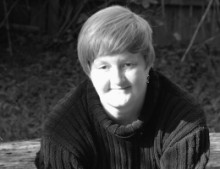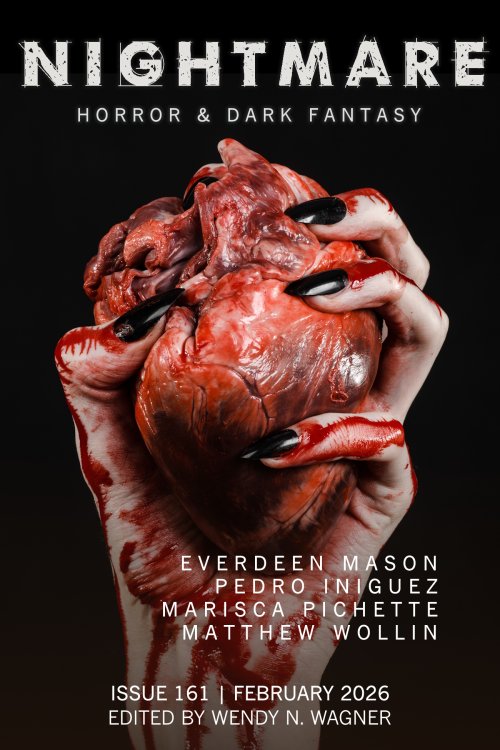It’s not often I cackle in glee when I finish reading short fiction, but this tale of Patreon ghostage-liness left me giggling with morbid delight. Tell us something about the inspiration behind this creative madness.
If it left you cackling, despite (or because of?) the morbidity, then my work is complete! This particular one came upon me all of a sudden in a swirl, but looking back I can tease out a couple of very distinct elements that had been stewing in my subconscious for a while. The central postcard idea came from author Nicole Cushing, whose Patreon offers one tier that includes her sending a monthly postcard with a delightfully horrific drawing on the back. So far, however, no ghosts attached . . . A number of the haunted house microfictions began as little exercise attempts to conjure up images that might fit in a Matthew M. Bartlett story. Finally, the “Gordon B. White” author insert arose in large part from re-reading Jeffrey Ford’s stories (like “Word Doll”) which occasionally include a “Jeff Ford” character. (Of course, it also comes from wanting to see my name in print as many times as possible.) Then, one night, lightning hit this primordial soup of influences, and the first draft crawled out.
Do you believe in ghosts? What is one of the most peculiar ghost stories you’ve ever heard?
I want to believe in ghosts more than I actually do believe. Of course, I want to do lots of things more that I actually do them, so maybe that says something about me?
My dad grew up in rural North Carolina, and so I grew up hearing a lot of ghost stories from him. All of them, of course, were “true.” As a testament to his gift as a storyteller, even now I don’t know which were actually true, which he thought were true, and which he just fabricated completely for the sake of a good yarn. One that always sticks with me is about one night when he was driving alone to pick up his father from the late shift at work. Driving on a lonesome back road through the tobacco fields, mist rising up, suddenly an old woman with long white hair and a gray shawl appeared in his headlights, waving to him from the side of the road. Surprised, he drove past, but also being a good Southern boy, he turned around and drove back, slowly this time. As he got to her, he stopped and rolled down the window, at which point she crossed the road to him. She reached in and, as older people often do, gripped his arm while she spoke.
“My son,” she said. “He’s been drinking again and he’s locked me out of the house.” She pointed with her other hand back up a small dirt path that might have been a driveway. From the road, though, nothing was visible. “Please,” she continued. “You have to help me get back in.”
My father had never seen her before. He didn’t know who lived out here. What stuck with him, though, and what he would describe in minute detail even forty years later were the small things: the wrinkles on her face (“Like Grandma Jessie Lou,” he gave us kids as a point of comparison); the gray knitted shawl; the warmth of her hand on his arm despite the cool night.
Of course, he said. He had to go pick up his father, but they’d be right back to help her. She let go and stepped back to the side of the road, and then my father took off.
You can guess most of the rest. He picks up his father; his father brusquely poo-poos the idea of anyone living out there; their trip back along the same road is devoid of women, old or otherwise. No house lights in the field. Nothing there but tobacco and fog.
But the next day, my father goes back during the daylight. He figures roughly where it was, finds what must be the dirt path off the road. He drives down it and . . . nothing. No house with a hungover son; no grown man to tell him “Why no, my ma died years ago”; no burned out foundation. Just nothing. Nothing at all.
And what sticks with me—thirty years after hearing it—isn’t necessarily the question of “Who was waving him down that night?” but rather “What would have happened had he followed it into the fog?”
There is a certain delicious thrill to stories where the line between fiction and reality blur and the reader is thrust into the meta in the tale. Here, I particularly enjoyed the final scene with the laptop computer and the eager anticipation of the ghosts as they wait to see what the reader will do. If you were the hapless Patreon supporter who found yourself suddenly haunted, would you have entered your credit card info?
I am very risk averse, so yes, certainly. I would also probably elect for the much more expensive one-and-done solution, because I’m someone who would rather do something the hard way once than the easy way over time. Besides, I’ve certainly impulse bought things that are far less useful than a full de-ghosting!
You have a short story collection out and your work can be found all over the internet. Are there any writing projects waiting in the wings? What can eager readers look forward to in 2021?
Last year I put out my debut short story collection As Summer’s Mask Slips and Other Disruptions shortly before everything went topsy-turvy. This year, I have a few stories scheduled to come out in various places over the year, but October 2021 is going to be my big month.
First, my second-person story of dinner party divination gone awry, “From October Vines,” will be in Weird Horror No. 3 from Undertow Publications. I’ve been a big fan of Undertow for years, so this is a treat. The really exciting news, though, is that October 15th will also see the release of my first novella, Rookfield, from Trepidatio Publishing. Written during 2020, Rookfield follows Cabot Howard as he tracks down his ex-wife and their son who have fled the pandemic to the backwoods town of Rookfield. Once in Rookfield, however, Cabot finds that the children all wear masks like little plague doctors and the adults all want him out before nightfall. It’s a pandemic noir thriller meets folk horror fever dream.
And finally, as a sneak preview, in February 2022, Trepidatio will be publishing the cosmic horror novella I co-wrote with Rebecca J. Allred: And in Her Smile, The World. It’s about a secret cult of women with an alternative creation myth . . . and why telling them to smile is a bad idea.









